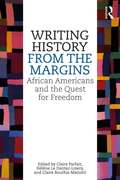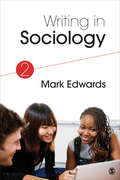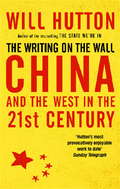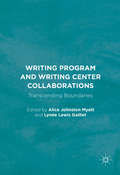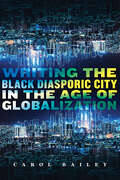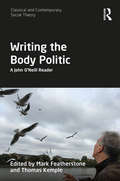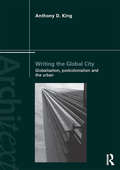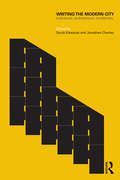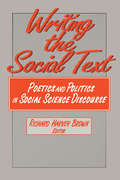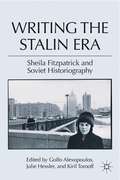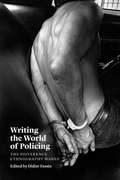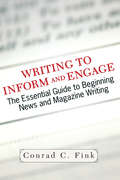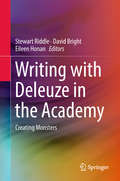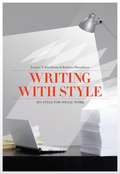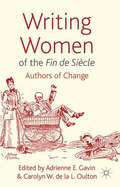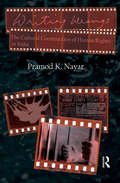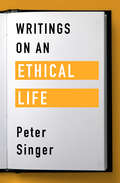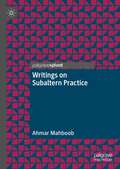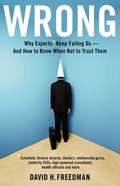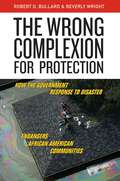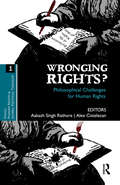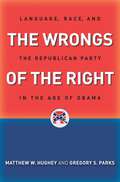- Table View
- List View
Writing History from the Margins: African Americans and the Quest for Freedom
by Claire Parfait Hélène Le Dantec-Lowry Claire Bourhis-MariottiWith contributions from leading American and European scholars, this collection of original essays surveys the actors and the modes of writing history from the "margins" of society, focusing specifically on African Americans. Nearly 100 years after The Journal of Negro History was founded, this book assesses the legacy of the African American historians, mostly amateur historians initially, who wrote the history of their community between the 1830s and World War II. Subsequently, the growth of the civil rights movement further changed historical paradigms--and the place of African Americans and that of black writers in publishing and in the historical profession. Through slavery and segregation, self-educated and formally educated Blacks wrote works of history, often in order to inscribe African Americans within the main historical narrative of the nation, with a two-fold objective: to make African Americans proud of their past and to enable them to fight against white prejudice. Over the past decade, historians have turned to the study of these pioneers, but a number of issues remain to be considered. This anthology will contribute to answering several key questions concerning who published these books, and how were they distributed, read, and received. Little has been written concerning what they reveal about the construction of professional history in the nineteenth century when examined in relation to other writings by Euro-Americans working in an academic setting or as independent researchers.
Writing in Sociology
by Mark Evan EdwardsWith humor and empathy, Mark Edwards’s handbook provides undergraduate and early-career graduate students guidance in sociological writing of all kinds. Writing in Sociology offers unusual approaches to developing ideas into research questions, utilizing research literature, constructing research papers, and completing different kinds of course writing (including case studies, theory papers, and applied social science projects). New chapters in the Second Edition offer insights into giving and receiving effective peer review and presenting qualitative research results. By focusing on how to think about the goals and strategies implicit in each section of a writing project this book provides accessible advice to novice sociological writers.
Writing in Sociology
by Mark Evan EdwardsWith humor and empathy, Mark Edwards’s handbook provides undergraduate and early-career graduate students guidance in sociological writing of all kinds. Writing in Sociology offers unusual approaches to developing ideas into research questions, utilizing research literature, constructing research papers, and completing different kinds of course writing (including case studies, theory papers, and applied social science projects). New chapters in the Second Edition offer insights into giving and receiving effective peer review and presenting qualitative research results. By focusing on how to think about the goals and strategies implicit in each section of a writing project this book provides accessible advice to novice sociological writers.
Writing Neoliberal Values: Rhetorical Connectivities and Globalized Capitalism (Rhetoric, Politics and Society)
by Rachel C. RiednerThis book examines human-interest stories, unpacking from them violence inherent to neoliberalism, and considers if it is possible to find in these stories hints of people and labour that suggest other narratives.
The Writing On The Wall: China And The West In The 21st Century
by Will HuttonChina constitutes a fifth of the world's population. Over the last twenty years its economy has doubled to make it the fifth largest economy in the world; if the pace is repeated over the next twenty it is set to become second only to the US. The speed of its development is stunning, a combination of cheap labour and commitment to science and technology that has never been matched by a developing country. The Pearl River Delta, Shanghai and Beijing have become city-regions whose growth and embrace of modernity strike the visitor with awesome force. This is a continent on the move, recovering the world position and wealth it once had.The re-emergence of China as a superpower constitutes the biggest challenge the world has had for more than a century. Never before in modern times has the financial, trade, economic and diplomatic world pecking order been so profoundly reconstituted with the challenger country itself in the grips of incredible ideological and political change. This is a transition both internally in China and externally in the world beyond beset by hazard and risk. The world's peace and prosperity depends upon it being executed successfully.
The Writing On The Wall: China And The West In The 21St Century
by Will HuttonChina constitutes a fifth of the world's population. Over the last twenty years its economy has doubled to make it the fifth largest economy in the world; if the pace is repeated over the next twenty it is set to become second only to the US. The speed of its development is stunning, a combination of cheap labour and commitment to science and technology that has never been matched by a developing country. The Pearl River Delta, Shanghai and Beijing have become city-regions whose growth and embrace of modernity strike the visitor with awesome force. This is a continent on the move, recovering the world position and wealth it once had.The re-emergence of China as a superpower constitutes the biggest challenge the world has had for more than a century. Never before in modern times has the financial, trade, economic and diplomatic world pecking order been so profoundly reconstituted with the challenger country itself in the grips of incredible ideological and political change. This is a transition both internally in China and externally in the world beyond beset by hazard and risk. The world's peace and prosperity depends upon it being executed successfully.
Writing Program and Writing Center Collaborations
by Alice Johnston Myatt Lynée Lewis GailletThis book demonstrates how to develop and engage in successful academic collaborations that are both practical and sustainable across campuses and within local communities. Authored by experienced writing program administrators, this edited collection includes a wide range of information addressing collaborative partnerships and projects, theoretical explorations of collaborative praxis, and strategies for sustaining collaborative initiatives. Contributors offer case studies of writing program collaborations and honestly address both the challenges of academic collaboration and the hallmarks of successful partnerships.
Writing the Black Diasporic City in the Age of Globalization
by Carol BaileyWriting the Black Diasporic City in the Age of Globalization theorizes the city as a generative, “semicircular” social space, where the changes of globalization are most profoundly experienced. The fictive accounts analyzed here configure cities as spaces where movement is simultaneously restrictive and liberating, and where life prospects are at once promising and daunting. In their depictions of the urban experiences of peoples of African descent, writers and other creative artists offer a complex set of renditions of twentieth- and twenty-first-century Black urban citizens’ experience in European or Euro-dominated cities such as Boston, London, New York, and Toronto, as well as Global South cities such as Accra, Kingston, and Lagos—that emerged out of colonial domination, and which have emerged as hubs of current globalization. Writing the Black Diasporic City draws on critical tools of classical postcolonial studies as well as those of globalization studies to read works by Ama Ata Aidoo, Amma Darko, Marlon James, Cecil Foster, Zadie Smith, Michael Thomas, Chika Unigwe, and other contemporary writers. The book also engages the television series Call the Midwife, the Canada carnival celebration Caribana, and the film series Small Axe to show how cities are characterized as open, complicated spaces that are constantly shifting. Cities collapse boundaries, allowing for both haunting and healing, and they can sever the connection from kin and community, or create new connections.
Writing the Body Politic: A John O’Neill Reader (Classical and Contemporary Social Theory)
by Mark Featherstone Thomas KempleThis book brings together key essays from the career of social theorist John O’Neill, including his uncollected later writings, focusing on embodiment to explore the different ways in which the body trope informs visions of familial, economic, personal, and communal life. Beginning with an exploration of O’Neill’s work on the construction of the biobody and the ways in which corporeality is sutured into social systems through regimes of power and familial socialisation, the book then moves to concentrate on O’Neill’s career-long studies of the productive body and the ways in which the working body is caught in and resists disciplinary systems that seek to rationalise natural functions and control social relations. The third section considers O’Neill’s concern with the ancient, early modern, and psychoanalytic sources of the post-modern libidinal body, and a final section on the civic body focuses specifically on the ways in which principles of reciprocity and generosity exceed the capitalist, individualist body of (neo)liberal political theory. The volume also includes an interview with O’Neill addressing many of the key themes of his work, a biographical note with an autobiographical postscript, a select bibliography of O’Neill’s many publications, and an extensive introduction by the editors. A challenging and innovative collection, Writing the Body Politic: A John O’Neill Reader will appeal to critical social theorists and sociologists with interests in the work of one of sociology’s great critical readers of classical and contemporary texts.
Writing the Global City: Globalisation, Postcolonialism and the Urban (Architext)
by Anthony D KingOver the last three decades, our understanding of the city worldwide has been revolutionized by three innovative theoretical concepts – globalisation, postcolonialism and a radically contested notion of modernity. The idea and even the reality of the city has been extended out of the state and nation and re-positioned in the larger global world. In this book Anthony King brings together key essays written over this period, much of it dominated by debates about the world or global city. Challenging assumptions and silences behind these debates, King provides largely ignored historical and cultural dimensions to the understanding of world city formation as well as decline. Interdisciplinary and comparative, the essays address new ways of framing contemporary themes: the imperial and colonial origin of contemporary world and global cities, actually existing postcolonialisms, claims about urban and cultural homogenisation and the role of architecture and built environment in that process. Also addressed are arguments about indigenous and exogenous perspectives, Eurocentricism, ways of framing vernacular architecture, and the global historical sociology of building types. Wide-ranging and accessible, Writing the Global City provides essential historical contexts and theoretical frameworks for understanding contemporary urban and architectural debates. Extensive bibliographies will make it essential for teaching, reference and research.
Writing the Modern City: Literature, Architecture, Modernity
by Sarah Edwards Jonathan CharleyLiterary texts and buildings have always represented space, narrated cultural and political values, and functioned as sites of personal and collective identity. In the twentieth century, new forms of narrative have represented cultural modernity, political idealism and architectural innovation. Writing the Modern City explores the diverse and fascinating relationships between literature, architecture and modernity and considers how they have shaped the world today. This collection of thirteen original essays examines the ways in which literature and architecture have shaped a range of recognisably ‘modern’ identities. It focuses on the cultural connections between prose narratives – the novel, short stories, autobiography, crime and science fiction – and a range of urban environments, from the city apartment and river to the colonial house and the utopian city. It explores how the themes of memory, nation and identity have been represented in both literary and architectural works in the aftermath of early twentieth-century conflict; how the cultural movements of modernism and postmodernism have affected notions of canonicity and genre in the creation of books and buildings; and how and why literary and architectural narratives are influenced by each other’s formal properties and styles. The book breaks new ground in its exclusive focus on modern narrative and urban space. The essays examine texts and spaces that have both unsettled traditional definitions of literature and architecture and reflected and shaped modern identities: sexual, domestic, professional and national. It is essential reading for students and researchers of literature, cultural studies, cultural geography, art history and architectural history.
Writing the Social Text: Poetics and Politics in Social Science Discourse
by Richard BrownDuring the past decade, it has become commonplace to interpret social and cultural reality-the very groundwork of the social sciences-as linguistic constructions. Not only is society viewed as a text, but scientific texts themselves are seen as rhetorical constructions. This collection of scholarly essays begins with an overview of this emerging field, and covers the specific stylistic practices by which social scientists create -objective- or -true- representations of society. The volume closes with a consideration of the more telling challenges to the rhetorics of the social sciences and how these might be encompassed or overcome.
Writing the Stalin Era
by Golfo Alexopoulos Julie Hessler Kiril TomoffCovering topics such as the Soviet monopoly over information and communication, violence in the gulags, and gender relations after World War II, this festschrift volume highlights the work and legacy of Sheila Fitzpatrick offers a cross-section of some of the best work being done on a critical period of Russia and the Soviet Union.
Writing the World of Policing: The Difference Ethnography Makes
by Didier FassinAs policing has recently become a major topic of public debate, it was also a growing area of ethnographic research. Writing the World of Policing brings together an international roster of scholars who have conducted fieldwork studies of law enforcement in disadvantaged urban neighborhoods on five continents. How, they ask, can ethnography illuminate the role of the police in society? Are there important aspects of policing that are not captured through interviews and statistics? And how can the study of law enforcement shed light on the practice of ethnography? What might studying policing teach us about the epistemological and ethical challenges of participant observation? Beyond these questions of crucial interest for criminology and, more generally, the social sciences, Writing the World of Policing provides a timely discussion of one of the most problematic institutions in contemporary society.
Writing To Inform And Engage: The Essential Guide To Beginning News And Magazine Writing
by Conrad C. FinkDesigned with the beginning journalism student in mind, this undergraduate textbook for fledgling reporters is a reference guide and an instructive text full of real-world examples and writing exercises. Conrad C. Fink, a long-time reporter and bureau chief with the Associated Press, leads journalism students through the basics of news writing, fo
Writing with Deleuze in the Academy: Creating Monsters
by Stewart Riddle David Bright Eileen HonanIn this book, authors working with Deleuzean theories in educational research in Australia and the United Kingdom grapple with how the academic-writing machine might become less contained and bounded, and instead be used to free impulses to generate different creations and connections. The authors experiment with forms of writing that challenge the boundaries of academic language, moving beyond the strictures of the scientific method that governs and controls what works and what counts to make language vibrate with a new intensity.The authors construct monstrous creations, full of vitality and fervor, hybrid texts, part academic part creative assemblages, almost-but-perhaps-not-quite recognisable as research. Stories that blur the lines between true and untrue, re-presentation and invention.The contributors to this book hope that something might happen in its reading; that some new connections might be made, but also acknowledge the contingency of the encounter between text and reader, and the impossibility of presuming to know what may be.
Writing with Style: APA Style for Social Work
by Lenore T. Szuchman; Barbara ThomlisonIn addition to reviewing APA style basics, the text includes numerous writing exercises to help students apply what they learn and hone their skills by practicing writing professional literature. Further support is provided through resources such as sample outlines, title pages, abstracts, and numerous templates included throughout the text as references.
Writing Women of the Fin de Siècle: Authors of Change
by Adrienne E. Gavin Carolyn W. de la L. OultonConcentrating on a period of significant social and political change and exploring both canonical and newly rediscovered texts, this book critically assess the changing culture of the late-Victorian period as represented by a range of women writers through a range of essays by leading academics in the field and cutting-edge work by newer scholars.
Writing Wrongs: The Cultural Construction of Human Rights in India
by Pramod K. NayarThis book examines the ‘cultural apparatus’ of Human Rights in India today. It unravels discourses of victimhood, oppression, suffering and witnessing through a study of autobiographies, memoirs, reportage and media coverage, and documentaries. Moving across multiple media and genres for their representations of Dalits, riot victims, prisoners, abused and abandoned women and children, examining the formal properties of victim texts for their documentation of trauma, and analyzing the role of the sympathetic imagination, Writing Wrongs inaugurates a whole new field in literary–cultural studies by focusing on the narratives that build the culture of Human Rights. It argues for taking this cultural apparatus as essential to the political and legal dimensions of Human Rights. The book emphasizes the need for an ethical turn to literary–cultural studies and a cultural turn to Human Rights studies, arguing that a public culture of Human Rights has a key role to play in revitalizing civil society and its institutions. It will be of interest to Human Rights scholars and activists, and those in political science, sociology, literary and cultural studies, narrative theory and psychology.
Writings on an Ethical Life (Isnm Ser. #Vol. 138)
by Peter SingerThe essential collection of writings by one of the most visionary and daring philosophers of our time Since bursting sensationally into the public consciousness in 1975 with his groundbreaking work Animal Liberation, Peter Singer has remained one of the most provocative ethicists of the modern age. His reputation, built largely on isolated incendiary quotations and outrage-of-the-moment news coverage, has preceded him ever since. Aiming to present a more accurate and thoughtful picture of Singer's pioneering work, Writings on an Ethical Life features twenty-seven excerpts from some of his most lauded and controversial essays and books. The reflections on life, death, murder, vegetarianism, poverty, and ethical living found in these pages come together in a must-read collection for anyone seeking a better understanding of the issues that shape our world today. This ebook features an illustrated biography of Peter Singer, including rare photos from the author's personal collection.
Writings on Subaltern Practice
by Ahmar MahboobSubaltern theory emerged as a small voice within academia decades ago. Over time, this work generated significant debate and numerous publications, talks, and conferences. However, little has changed in the experienced lives of the masses. This led people to wonder: “the subalterns seem to have a voice, but can they take action?”; or, in other words, is there subaltern practice?This collection of essays and poems, written with a broad audience in mind, hopes to demonstrate not just how the subaltern can identify and question hegemonic practices, but how they can create alternative frameworks and material that enable themselves and their communities. In doing so, this book aims to demonstrate not just how deep the colonial poisons run, but also how to detoxify ourselves and the environment around us.The writings included in this book study the inequalities that we experience in and around us and suggest actions and practices that can help us regain harmony. It is a call for action and a sharing of ideas that can enable us to regain balance and fulfil our human responsibilities.
Wrong: Why Experts* Keep Failing Us--and How to Know When Not to Trust Them *Scientists, Finance Wizards, Doctors, Relationship Gurus, Celebrity CEOs, High-powered Consultants, Health Officials and More
by David H. FreedmanFrom the author of "A Perfect Mess" comes an eye-opening exploration of why experts are constantly misleading the public--and what can be done about it.
The Wrong Complexion for Protection: How the Government Response to Disaster Endangers African American Communities
by Robert D. Bullard Beverly WrightWhen the images of desperate, hungry, thirsty, sick, mostly black people circulated in the aftermath of Hurricane Katrina, it became apparent to the whole country that race did indeed matter when it came to government assistance. In The Wrong Complexion for Protection, Robert D. Bullard and Beverly Wright place the government response to natural and human-induced disasters in historical context over the past eight decades. They compare and contrast how the government responded to emergencies, including environmental and public health emergencies, toxic contamination, industrial accidents, bioterrorism threats and show that African Americans are disproportionately affected. Bullard and Wright argue that uncovering and eliminating disparate disaster response can mean the difference between life and death for those most vulnerable in disastrous times.
Wronging Rights?: Philosophical Challenges for Human Rights (Ethics, Human Rights and Global Political Thought)
by Aakash Singh Rathore Alex CistelecanThis book brings together two of the most powerful and relevant philosophical critiques of human rights: the post-colonialist and the post-Althusserian, its balanced internal structure not just throwing these two critiques together, but actually forcing them to enter into confrontation and dialogue. The book is organised in three parts: at each end, the post-colonialist and the post-Althusserian critiques are represented by some of their main thinkers (Ratna Kapur, G. C. Spivak, Upendra Baxi; Slavoj Žižek, Jacques Rancière), while in the middle, an American intermezzo (Richard Rorty, Wendy Brown) functions as a genuine Derridian supplement: always already contaminating the purity of the two theoretical schools, preventing their enclosure and, hence, fuelling and complicating further their mutual confrontation. As in any authentic dialogue, the introduction and the conclusion each claim victory for one of the sides by changing the very terms and rules of the dialogue, picturing it as a confrontation between emancipatory universalism and inefficient particularism (from the perspective of the post-Althusserians), or as a split between hypocrisy and truth (from the perspective of the post-colonialists).
The Wrongs of the Right: Language, Race, and the Republican Party in the Age of Obama
by Gregory S. Parks Matthew W. HugheyOn November 5, 2008, the nation awoke to a New York Times headline that read triumphantly: "OBAMA. Racial Barrier Falls in Heavy Turnout." But new events quickly muted the exuberant declarations of a postracial era in America: from claims that Obama was born in Kenya and that he is not a true American, to depictions of Obama as a "Lyin African" and conservative cartoons that showed the new president surrounded by racist stereotypes like watermelons and fried chicken. Despite the utopian proclamations that we are now live in a color-blind, postracial country, the grim reality is that implicit racial biases are more entrenched than ever. In Wrongs of the Right, Matthew W. Hughey and Gregory S. Parks set postracial claims into relief against a background of pre- and post-election racial animus directed at Obama, his administration, and African Americans. They provide an analysis of the political Right and their opposition to Obama from the vantage point of their rhetoric, a history of the evolution of the two-party system in relation to race, social scientific research on race and political ideology, and how racial fears, coded language, and implicit racism are drawn upon and manipulated by the political Right. Racial meanings are reservoirs rich in political currency, and the Right's replaying of the race card remains a potent resource for othering the first black president in a context rife with Nativism, xenophobia, white racial fatigue, and serious racial inequality. And as Hughey and Parks show, race trumps politics and policies when it comes to political conservatives' hostility toward Obama.
